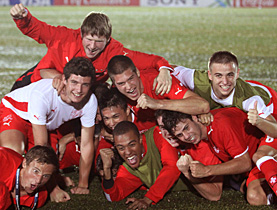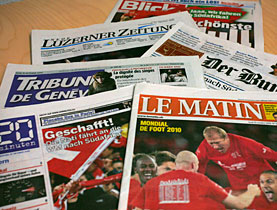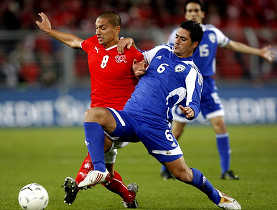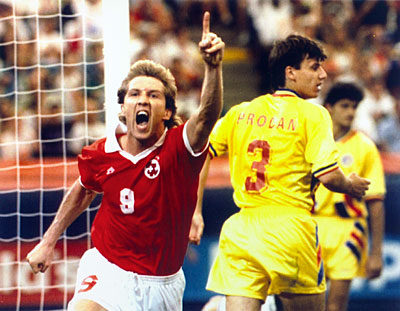Teenage footballers extend African dream

Speed, skill and self-confidence have propelled the Swiss Under 17 squad into the semifinals of the World Cup in Nigeria.
This is a crowning achievement for Hansruedi Hasler, who has been responsible for nurturing young Swiss players for 15 years and is retiring at the end of the year.
While the “big boys” have booked their tickets for next year’s World Cup in South Africa, the U17 team is already sampling African hospitality.
On Thursday they beat Colombia 4-0 in Lagos – adding to wins against Brazil, Germany and Italy – and prolonging their African adventure until Sunday’s final. There they will meet hosts Nigeria, who beat Spain 3-1 on Thursday.
“A dream of a farewell present,” Hasler told swissinfo.ch. The Swiss Football Association’s technical director for young players is flying to Lagos on Wednesday along with his successor Peter Knaebel.
Experience
To gain experience, to be spotted by talent scouts, to have fun and obviously to win – the aims of the youngsters on the African (artificial) grass are clear.
The physical and mental demands of a major event can also benefit young players.
“They have to play five games at a very high level – maybe even seven,” Hasler said. “Apart from forward Nassim Ben Khalifa, who plays in the Super League [Switzerland’s top division], the players have never encountered this level of quality.”
In addition there is mental pressure. “You are wearing the national strip, are in the spotlight and have to prove yourself. That experience will be useful when they are 20 or so.”
No surprise
Although the presence of the Swiss teenagers among the best four teams in the world is a sensation, it’s not in fact a surprise.
In May they reached the semis of the U17 European Championship in Germany – where they lost to Holland – booting out France and Spain along the way.
So far in Nigeria the young Swiss have notched up 13 goals – only the Spaniards and Nigerians have scored more.
But while his players generate excitement on the pitch, coach Dany Ryser remains calm and almost inconspicuous next to it. But he has a plan for every situation.
Progress
But if Ryser is the father of the U17’s latest success, Hasler is the team’s godfather.
“Systematic” is a word that Hasler frequently uses. It was how he went about building his role: analysis, optimisation, objective, implementation.
“Thanks to the good work by the clubs and the football association, young players today are significantly better developed. They are physically stronger, mentally more advanced and technically very, very strong,” he said, summing up the fruits of his labour.
“As a result, every year there are 15-20 good players from whom the association can build a good team. In the mid-1990s on the other hand the talent pool was limited.”
Commitment
But the pearls formed by the Swiss Football Association also develop their own desires – and they’re not always welcome.
Top players Mladen Petric, Ivan Rakitic and Zdravko Kuzmanovic all learnt their trade in Switzerland, but as dual nationals chose to play for Croatia or Serbia.
“We’re aware of this problem,” Hasler said, explaining that the Swiss Football Association is implementing a career planning scheme in an attempt to curb these defections. And it seems to be having an effect.
“The line-up for the first team’s recent World Cup qualifier against Israel included seven dual nationals whom we succeeded in keeping,” he said.
However, his efforts are being thwarted by Fifa, football’s world governing body, which recently permitted players – irrespective of age – to change national teams once.
“In this respect our hands are somewhat tied,” he admitted.
But Hasler isn’t a quitter. Before he sets off for Lagos, he says that in addition to good support, the best way to commit young players to Switzerland is success.
Renat Künzi, swissinfo.ch (Adapted from German by Thomas Stephens)
2002: U17 European Champions; U21 European semifinalists.
2004: U19 European semifinalists.
2005: U20 qualified for the World Cup.
2009: U17 European semifinalists and World Cup finalists.

In compliance with the JTI standards
More: SWI swissinfo.ch certified by the Journalism Trust Initiative




You can find an overview of ongoing debates with our journalists here. Please join us!
If you want to start a conversation about a topic raised in this article or want to report factual errors, email us at english@swissinfo.ch.